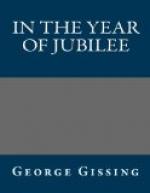‘I was his mistress, never his wife.’
And all her desperate endeavours to obscure the history of their love, to assert herself as worthy to be called wife, mother, had fallen fruitless. Those long imploring letters, despatched to America from her solitude by the Cornish sea, elicited nothing but a word or two which sounded more like pity than affection. Pity does not suffice to recall the wandering steps of a man wedded against his will.
In her heart, she absolved him of all baseness. The man of ignoble thought would have been influenced by her market value as a wife. Tarrant, all the more because he was reduced to poverty, would resolutely forget the crude advantage of remaining faithful to her.
Herein Nancy proved herself more akin to her father than she had ever seemed when Stephen Lord sought eagerly in her character for hopeful traits.
The severity of her self-judgment, and the indulgence tempering her attitude towards Tarrant, declared a love which had survived its phase of youthful passion. But Nancy did not recognise this symptom of moral growth. She believed herself to have become indifferent to her husband, and only wondered that she did not hate him. Her heart seemed to spend all its emotion on the little being to whom she had given life—a healthy boy, who already, so she fancied, knew a difference between his mother and his nurse, and gurgled a peculiar note of contentment when lying in her arms. Whether wife or not, she claimed every privilege of motherhood. Had the child been a weakling, she could not have known this abounding solace: the defect would have reproached her. But from the day of his birth he manifested so vigorous a will to live, clung so hungrily to the fountain-breast, kicked and clamoured with such irresistible self-assertion, that the mother’s pride equalled her tenderness. ’My own brave boy! My son!’ Wonderful new words: honey upon the lips and rapture to the ear. She murmured them as though inspired with speech never uttered by mortal.
The interval of a day between her journeys to see the child taxed her patience; but each visit brought a growth of confidence. No harm would befall him: Mary had chosen wisely.
Horace kept aloof and sent no message. When at length she wrote to him a letter all of sisterly kindness, there came a stinted reply. He said that he was going away for a holiday, and might be absent until September. ’Don’t bother about me. You shall hear again before long. There’s just a chance that I may go in for business again, with prospect of making money. Particulars when I see you.’
Nancy found this note awaiting her after a day’s absence from home, and with it another. To her surprise, Mrs. Damerel had written. ’I called early this afternoon, wishing particularly to see you. Will you please let me know when I should find you at home? It is about Horace that I want to speak.’ It began with ‘My dear Nancy,’ and ended, ‘Yours affectionately.’ Glad of the opportunity thus offered, she answered at once, making an appointment for the next day.




